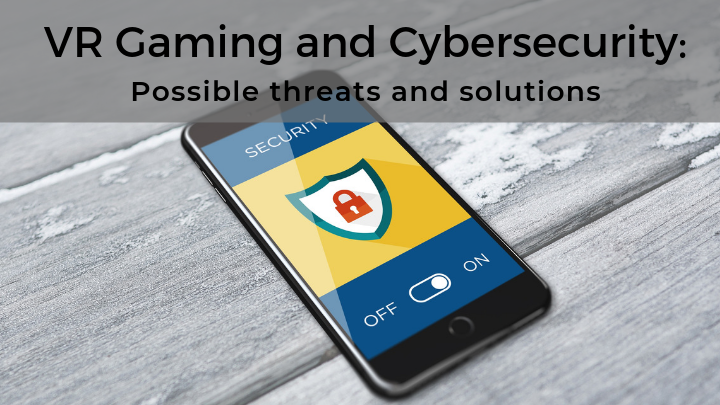Check out possible threats for Gamers and solutions regarding VR Gaming and Cybersecurity.

With over 171 million VR users worldwide, there’s no question about how popular this technology is becoming. We see major breakthroughs in the tech world on an almost daily basis, and more and more gamers are becoming invested in VR. Virtual Reality has reshaped the gaming industry – the graphics are becoming better, there’s more focus on the gameplay, the games are more immersive than ever, etc. One problem remains, however – cybersecurity.
Like any new technology, VR games could potentially pose significant cybersecurity threats that all gamers should be aware of. So, let’s see what some of the more serious threats are, and what users can do to stay safe.
Privacy and Security Concerns:
One of the biggest problems in the industry today is that there’s a great demand for new games that take fuller advantage of the AR/VR technology. Gamers want a more immersive experience, better and more realistic interactions, and a lot of other things. This forces companies to launch new products, and do it quickly.
The reason why this might pose a problem is that the sooner they launch new games, the less time they have for thorough security checks. This means that VR games have vulnerabilities that can easily be exploited by somewhat skilled hackers. And hackers can do much more than simply interrupt the game. Since most AR/VR games need to be connected to an email account, or even a social media account, this could be a severe threat.
VR developers have already stated that they will be collecting private data about their users, including email, birth date, and location. This personal information can be of great use to cybercriminals.
Identity Theft:
When a game developer collects sensitive information about their users, they become a big target for cyberattacks. One of the more serious things that gamers should be aware of is identity theft. About 10% of all Americans have reported that they’d been victims of identity theft, showing how serious this problem is.
Cybercriminals can use VR games to collect almost any data they need. Since the games are connected to email accounts and social media, crooks can gain easy access to them. From these accounts, they can get all the information they need for identity theft – from the date of birth and place of residence to the bank account and credit card information. This can then be used for making charges on the hacked accounts, getting medical services in the account owner’s name, committing credit card fraud, and more.

Surveillance:
Another problem with VR games is, of course, surveillance. For most AR/ VR games to work properly, they need access to the user’s location. They also use a gyroscope and an accelerometer to determine the user’s movement and orientation. For the games to be more immersive and provide better social interactions, they need access to the user’s microphone. All of these can improve the gaming experience tenfold, but they can also be used for surveillance.
Surveillance doesn’t just pose cybersecurity concerns – it can mean real-life, physical threats. The information collected can tell the attackers more about the gamer’s daily habits, their exact location, and even their home interior. Armed with this information, attackers can plan a robbery and cause physical harm.
A Way to Stay Safe:
For VR gamers who want to protect themselves, common sense is the most important thing. Don’t share any personal information with fellow gamers, and follow the security guidelines. To ensure better anonymity and better cybersecurity, relying on VPN while playing VR games is a must. A no log VPN (https://nordvpn.com/features/strict-no-logs-policy/) ensures, first and foremost, that none of the user’s personal information is collected and stored, offering greater anonymity.
It also changes the user’s IP address, effectively hiding their true location, and keeping them more secure. While users can still enjoy the location-based services of VR games, they don’t have to worry about surveillance. A VPN serves to encrypt the user’s connection to a network as well. Therefore, even if the network is unsecured, you are still protected from man-in-the-middle attacks.
The Bottom Line:
VR gaming is a fun new way to enjoy video games. It allows us to immerse ourselves into the game fully. But a smart gamer should be aware of all the potential cybersecurity threats and know how to stay safe. So make sure to employ at least some security measures.
